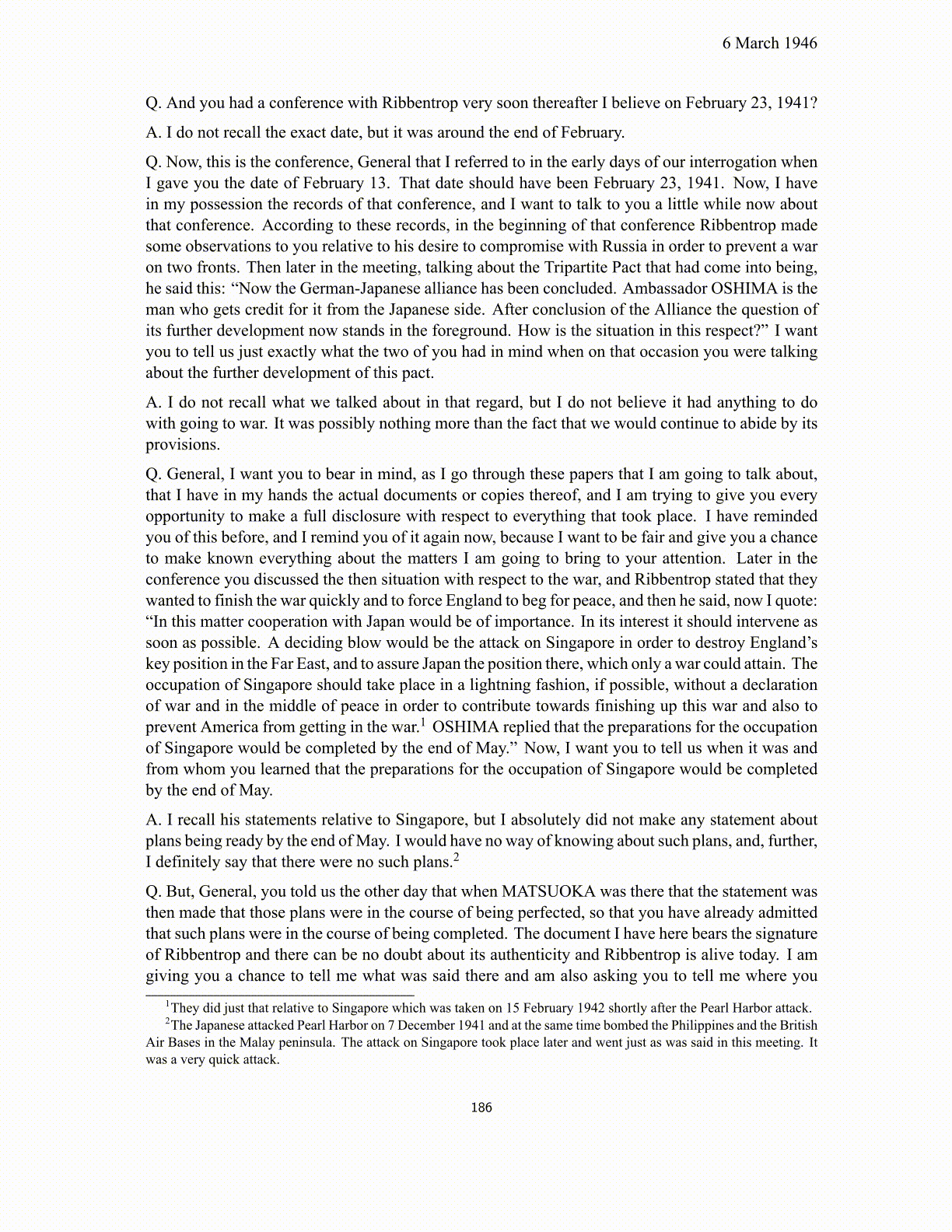
6 March 1946 Q. And you had a conference with Ribbentrop very soon thereafter I believe on February 23, 1941? A. I do not recall the exact date, but it was around the end of February. Q. Now, this is the conference, General that I referred to in the early days of our interrogation when I gave you the date of February 13. That date should have been February 23, 1941. Now, I have in my possession the records of that conference, and I want to talk to you a little while now about that conference. According to these records, in the beginning of that conference Ribbentrop made some observations to you relative to his desire to compromise with Russia in order to prevent a war on two fronts. Then later in the meeting, talking about the Tripartite Pact that had come into being, he said this: “Now the German-Japanese alliance has been concluded. Ambassador OSHIMA is the man who gets credit for it from the Japanese side. After conclusion of the Alliance the question of its further development now stands in the foreground. How is the situation in this respect?” I want you to tell us just exactly what the two of you had in mind when on that occasion you were talking about the further development of this pact. A. I do not recall what we talked about in that regard, but I do not believe it had anything to do with going to war. It was possibly nothing more than the fact that we would continue to abide by its provisions. Q. General, I want you to bear in mind, as I go through these papers that I am going to talk about, that I have in my hands the actual documents or copies thereof, and I am trying to give you every opportunity to make a full disclosure with respect to everything that took place. I have reminded you of this before, and I remind you of it again now, because I want to be fair and give you a chance to make known everything about the matters I am going to bring to your attention. Later in the conference you discussed the then situation with respect to the war, and Ribbentrop stated that they wanted to finish the war quickly and to force England to beg for peace, and then he said, now I quote: “In this matter cooperation with Japan would be of importance. In its interest it should intervene as soon as possible. A deciding blow would be the attack on Singapore in order to destroy England’s key position in the Far East, and to assure Japan the position there, which only a war could attain. The occupation of Singapore should take place in a lightning fashion, if possible, without a declaration of war and in the middle of peace in order to contribute towards finishing up this war and also to prevent America from getting in the war. 1 OSHIMA replied that the preparations for the occupation of Singapore would be completed by the end of May.” Now, I want you to tell us when it was and from whom you learned that the preparations for the occupation of Singapore would be completed by the end of May. A. I recall his statements relative to Singapore, but I absolutely did not make any statement about plans being ready by the end of May. I would have no way of knowing about such plans, and, further, I definitely say that there were no such plans. 2 Q. But, General, you told us the other day that when MATSUOKA was there that the statement was then made that those plans were in the course of being perfected, so that you have already admitted that such plans were in the course of being completed. The document I have here bears the signature of Ribbentrop and there can be no doubt about its authenticity and Ribbentrop is alive today. I am giving you a chance to tell me what was said there and am also asking you to tell me where you 1 They did just that relative to Singapore which was taken on 15 February 1942 shortly after the Pearl Harbor attack. 2 The Japanese attacked Pearl Harbor on 7 December 1941 and at the same time bombed the Philippines and the British Air Bases in the Malay peninsula. The attack on Singapore took place later and went just as was said in this meeting. It was a very quick attack. 186